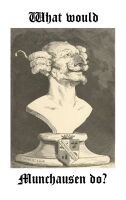|
Written by Charles McKeown & Terry Gilliam Directed by Terry Gilliam  Ironic but stirring, my favorite fantasy epic!
Ironic but stirring, my favorite fantasy epic!
There have been many Baron Munchausens through the years, and by that I do not mean merely that there have been many movie versions. The real Baron Hieronynimus Karl Friedrich von Munchausen (1720-1797), a resident of Göttingen, was a veteran of the wars with the Turks, and loved to tell outrageous tales with an imperturbable countenance, as if they had actually happened: these stories included his encounter with a ravenous wolf, from which he saved himself by reaching down into its jaws and turning it inside out, how his horse came to be bridled to the top of a church steeple, and his famous cannonball ride. (I myself have had a lifelong interest in the Baron and his tales, partly because several members of my family assert, without any real foundation that I can see, that the Baron is a distant relation.) The Baron never expected these tales to be taken literally; some scholars believe that he told them to drive away overly serious or otherwise boring visitors. Certainly he never expected to see his tales put into print without his permission, especially alongside other more remarkable tales falsely attributed to him, such as a trip to the moon, his adventures inside a giant sea monster, how he obtained his remarkable servants, and his meeting with Don Quixote, as well as other notable figures from literature. Some of these stories were added by an erstwhile companion of the Baron, Rudolph Erich Raspe, and others by the publisher. The Baron was understandably incensed at the appropriation of his own tall tales, and the connection of his good name to tales which made him seem to be a liar or a lunatic. McKeown and Gilliam's version of the Baron is nothing less than brilliant, for many reasons, first and foremost because as the movie begins, in a nameless town under siege by the Turks somewhere on the shores of the Mediterranean, the Baron is an old man, a laughingstock, a character in theatrical productions which do not present his stories correctly, a hero whose statue in the town square has been destroyed: he is already part of history when he returns to remind the world of his existence. He does so in grand style, captivating his audiences in the meantime. The Baron's foes in most versions of his adventures were wild animals, soldiers, and literary and historical figures; many of these do appear here, but his greatest enemy in this movie is none other than the Right Ordinary Horatio Jackson, a functionary who attempts to run the city by reason and Enlightenment, and who has no time for figures such as the Baron. Jackson sees the Baron as a fool, a liar, or a madman, while the Baron considers Jackson to be a sign of things to come, if he and his tales should ever pass from the world. In this sense the Baron is a very close relative of Don Quixote, who challenged the everyday reality in which the majority of his neighbors lived. Like Don Quixote, the Baron is both laughable and admirable at the same time, and the film's perspective is without a doubt told from the perspective of the Baron's view of reality. Gilliam and McKeown's insertion of the central conflict of Don Quixote rejuvenates the Baron and his tales, once again. This convoluted story could not have been told without a capable cast, and the casting directors outdid themselves. Particularly remarkable is John Neville as the Baron; I can think of no other actor who could have created a Baron who could tell such fantastic tales with such officiousness and dignity. Sarah Polley turns in a wonderful performance as his sidekick. I simply have never seen a better performance by a child actor. All of the other actors turn in wonderful performances as well, under what must have been very trying circumstances--the production was plagued with technical and funding problems from the start. Another factor which made the filming difficult was the sheer number of special effects and action sequences. This film is technically brilliant; its sets, camera work, and costumes all waver between believable and incredible, as is appropriate for a movie about the adventures of an incredible story teller. The cinematography is beautiful, and the sets on the moon and within the city are particularly well-done. The cast and crew, much like the Baron himself in the face of everyday reality, rose above their difficulties to create an immortal and immortalizing version of the Baron's amazing adventures. Another element of the film that ties is all together is Michael Kamen's wonderful score, which is by turns, as the film demands it, martial, lunatic, or stirring. Gilliam and Kamen together have created their finest work in this film. The music has also had a powerful effect upon my own life: many times when I have gotten into a scrape in some part of the globe or other I have heard the Baron's theme in my head, and the image of the Baron marching toward the Sultan's tent has given me the motivation to go on. It has thus gotten me out of many a tight spot--as many as the original story of the Baron, an early impetus for my own travels, has gotten me into. In short, though I cannot recommend this film to everyone, those who enjoy adventure, tall tales, and fantasy will enjoy it, as will those who remember such films as Korda's Thief of Baghdad and Curtiz' Robin Hood. To quote the Baron, it is "an interesting experience which I don't hesitate strongly to recommend"! |

